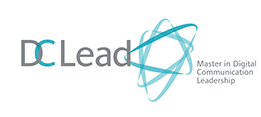As an overall goal the DCLead Programme will prepare its students for qualified jobs in a variety of fields around the area of digital communication such as the following:
- Already existing ICT and media companies, in their Research & Development or Business & Management Departments
- Innovative emerging new media and web companies
- Business companies and public institutions with needs of a digital communication strategy (e.g., in their Public Relations or Communications or IT Support Departments)
- Media companies/organisations operating on a European or international level (e.g., as strategic managers, as strategic policy or market analysts or as strategic analysts for user studies)
- European institutions working in the field of new media and society (e.g., European Parliament, European Commission, MEPs offices, etc. )
- National political and administrative institutions, including regulatory authorities in the media and communication field
- External scientific collaboration or consultancy in the field of new media and digital innovation
- Lobby organisations regarding innovation and communication policies
Through integrating the students into an international network of academic expertise and practical insights and focusing on strengthening and maximising the employability prospects of the students, the leadership approach of this programme empowers its graduates to become future leaders (e.g., as managers, entrepreneurs or scientific consultants, civil servants, administrators) within the relating fields of digital communication and media but also going beyond these fields within any company or institution who want to innovatively implement and use digital technologies in their strategic and operating business. The curriculum enhances this in two ways: First, it provides some courses with considerable participation of practitioners. Second, it encourages the students to already build up a network of potential future employers before graduation via each year’s Summer Symposium and by giving them the opportunity to spend the fourth semester as an internship at international associated business partners. In this way they can realise their master’s thesis with academic support from scientific supervisors and practical support from the hosting institution where they do their internship.


